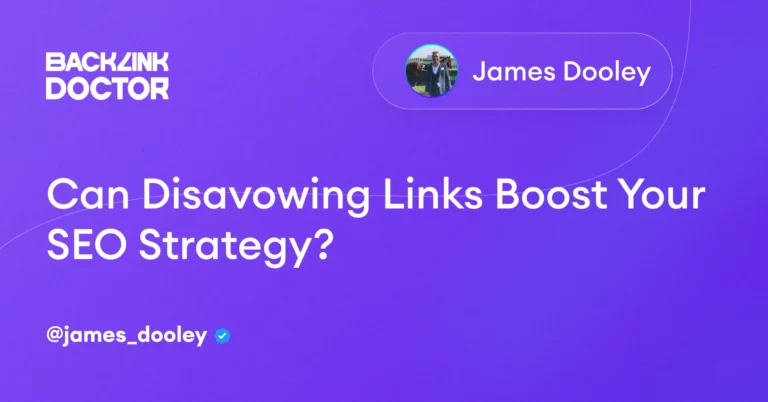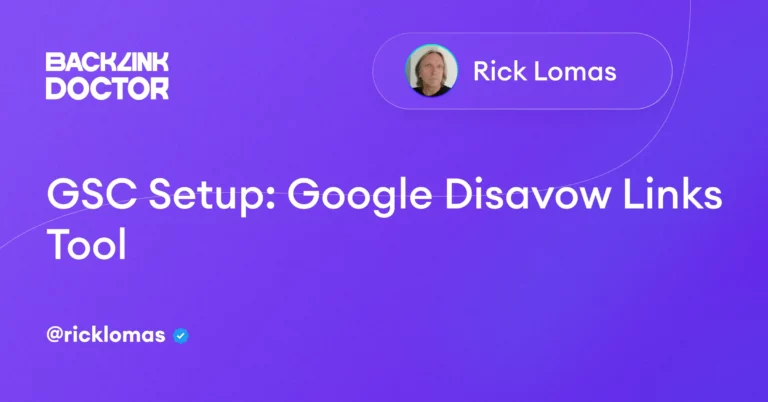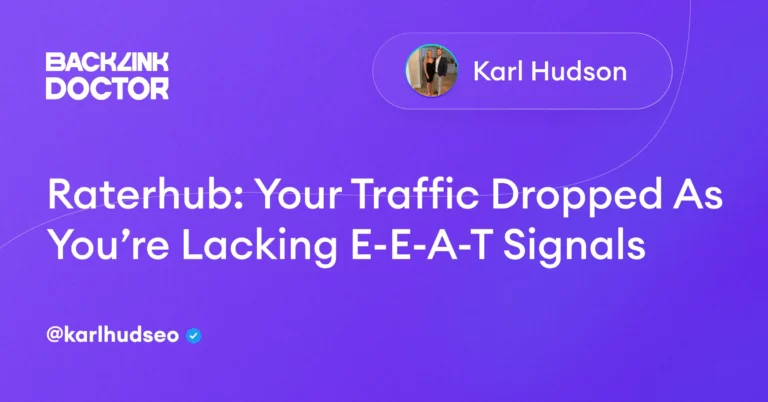Disavowing links is a potent SEO strategy that can aid in recovering sites from dramatic drops in rankings. Understanding how to utilize the Google Disavow Tool effectively is essential for success.
It’s a misconception that disavowing links doesn’t work. Such statements are as absurd as claiming backlinks won’t impact SEO in December 2025.
Instead, it’s crucial to recognize that the Google Disavow Tool can be beneficial and risky. If misused, it can hinder your website’s Google rankings.
Too many so-called SEO specialists attempt to submit a disavow file without truly understanding what constitutes a good link.
In this disavowing links guide, we’ll explore industry-leading insights on how the Google Disavow Tool can be your best friend if used correctly.
Why Does SEO Misinformation Persist?
Those familiar with my work know that I am all about networking and helping others succeed in the search engine optimization world. However, misinformation and SEO myths can still circulate.
One fundamental principle that SEO professionals must understand is the importance of proactivity:
IT IS ONLY A PROBLEM WHEN IT IS A PROBLEM – AND THEN IT IS TOO LATE
Avoid spreading mistruths or misinformation due to limited experience or lack of expertise in testing SEO practices. SEO pros must adopt a proactive approach to their efforts, focusing on disavowing toxic links, enhancing E-E-A-T signals, building topical authority, and acquiring quality new backlinks to thrive in the most competitive SERPs in 2025.
Debunking misinformation is crucial, as I have access to extensive SEO data sets and insights to help clarify common misconceptions.
A Look Back at Google Disavow Tool Perceptions
Years ago, several influential individuals within the SEO community warned against using the Google Disavow Tool. Consequently, untested myths and outdated opinions persist, leading to a need for more understanding about link trust, backlink toxicity, and detectable link patterns in backlink profiles.
Debunking the Myth
If you genuinely believe the Google Disavow Tool has no advantages, I challenge you to demonstrate this. Send information about a submitted disavow file to me here, and let’s publicly assess its accuracy.
Chances are, your disavow file may be missing toxic links or even include links that, despite some toxicity, pass power, relevance, and trust. If used incorrectly, the Google Search Console can do more harm than good:
Submitting a disavow file to Google Search Console without proper understanding can be more detrimental than helpful.
Rather than promoting falsehoods or misinformation, educate yourself on the proper use of the Google Disavow Tool to optimize its potential for your SEO strategy.
Why Many “Experts” Misinterpret Disavowing Links
There are countless examples demonstrating the effectiveness of disavowing links. Yet, many professionals still get it wrong.
Those who claim that disavowing backlinks is ineffective often say that backlinks don’t work – they are misinformed. It’s important to understand that not all backlinks are created equal.
True experts understand the following elements of backlinks:
- Backlink toxicity
- Trust associated with backlinks
- Traffic metrics
- Referring IP patterns
- Anchor text over-optimization
- Toxicity thresholds that vary across industries
- Backlink power
- Natural link placements
- Relevance
- Comprehensive list of Link Detox Rules
Here’s a surprising statistic:
Over the past 4 years of submitting disavow files, we have had to undisavow many backlinks in previous submissions.
About 97% of previously submitted disavow files contained backlinks providing some form of relevance, power, or trust.
Disavowing isn’t just about removing toxic links, but also ensuring you’re not removing beneficial ones that contribute to your site’s authority and trust.
Have you ever submitted a disavow file that ended up harming your website?
Maybe you didn’t consult a link detox expert who comprehends and examines backlink profiles daily.
How Our Team Exploits Backlinks Disavow Misinformation to Drive Success
Recently, our team has focused on growing our business through methods such as the bolt-on acquisition and rolling up investments for purchasing digital assets.
Our team of expert buyers researches websites that have experienced significant penalties or traffic drops to recover them.
When a site experiences negative impacts, two common issues arise: the need for a thorough link disavow service or issues with Raterhub, leading to a lack of E-E-A-T (Experience, Expertise, Authority, and Trust) signals.
Beyond these main concerns, our domain buyers are equipped to investigate:
- Website architecture through a silo internal linking audit
- Content optimization quality using Surfer SEO or Page Optimizer Pro on high CPC pages
- Whether the website is missing tier 2 backlinks for relevant tier 1 links
- Whether the website is lacking topical authority and could benefit from a ranking blueprint to create a content plan roadmap for scaling
- Conducting a comprehensive technical audit using Screaming Frog or Jet Octopus to uncover errors
Due to the SEO industry’s skepticism towards the efficacy of link disavowal, opportunities arise for acquiring penalized sites and reversing their dramatic traffic drops.
Top Place to Obtain a DFY Disavowing Links File
To obtain assistance with disavowing links and submitting a disavow file to Google Search Console, consider utilizing:
p>Don’t leave your problematic backlink profile to chance.
Conclusion
The industry must cease perpetuating misinformation, which creates a detrimental cycle of worsening situations.
While Google does an excellent job of ignoring spammy links in many cases, there are thresholds that, if surpassed, could severely impact your website’s ranking and traffic.
Don’t take chances—proactively disavow toxic and problematic backlinks pointing to your domain.
Google recommends using a disavow file “if you have a manual spam penalty or knowingly took part in link-building practices that might be harming you.”
Our tests indicate that proactively optimizing your Google Disavow File can future-proof your rankings and provide the leverage needed to acquire authoritative backlinks that improve your ranking.
Dive into these additional resources to learn how disavowing links can elevate your SEO strategy in 2025!
1. CognitiveSEO: When Not to Use the Google Disavow Tool (n.d.). https://cognitiveseo.com/blog/5328/when-not-to-use-the-google-disavow-tool/
2. Marie Haynes: Disavow Advice 2021 (n.d.). https://www.mariehaynes.com/disavow-advice-2021/
3. Google Webmasters: Disavow Backlinks (n.d.). https://support.google.com/webmasters/answer/2648487?hl=en
4. HubSpot: A Guide to Google’s Disavow Tool (n.d.). https://blog.hubspot.com/marketing/google-disavow



